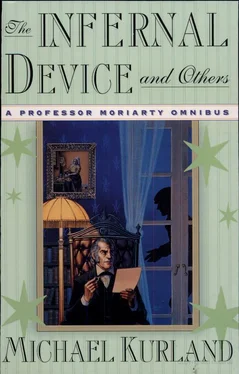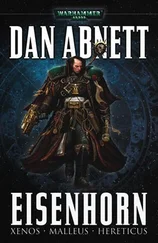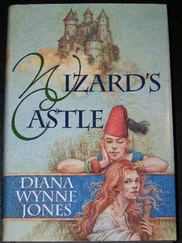"I served his father until he died two years ago, and now I serve his lordship."
"Ah!" Alberts said, wondering how the stout butler knew that his new lordship was still absent from Walbine House.
"Goodnight then, Constable," Lemming said, opening the great door as little as possible and pushing himself through the crack.
"Goodnight," Alberts said to the rapidly closing door. He waited until he heard the lock turned from the inside, and then resumed his measured stride along Regent's Gate. It was deathly quiet now; no more scurrying, no fancied noises, only the slight rustle of the wind through the distant trees and the echo of his own footsteps bouncing off the brick facades of the Georgian mansions that faced each other across the wide street.
At Cromwell Road, Constable Alberts paused under the street-lamp for a moment and peered thoughtfully around. He had the unwelcome sensation that he was being watched. By whom he could not tell, but the feeling persisted, an eerie, tingling sensation at the back of his neck. He turned and started back down the dark, fog-shrouded pavement.
From some distance away on Cromwell Road came the clattering noises of an approaching carriage, which grew steadily louder until, some twenty seconds later, a four-wheeler careened around the corner into Regent's Gate. The cab sped along the street, the horse encouraged by an occasional flick of the jarvey's whip. Entirely too fast, Alberts noted critically.
Halfway down Regent's Gate, opposite Walbine House, the jarvey pulled his horse to a stop. From where Alberts stood he could make out the form of a top-hatted man in evening dress emerging from the four-wheeler and tossing a coin up to the jarvey. The Right Honorable the Lord Walbine had obviously just returned home for the night. Lemming, Alberts thought, had been right.
The four-wheeler pulled away and rattled on down the street as his lordship let himself into Walbine House. All was quiet again P.C. Alberts resumed his beat, the tread of his footsteps once more the only sound to be heard along the tree-lined street. He kept to a steady methodical pace as he headed toward Kensington Gore.
It took P.C. Alberts almost ten minutes to make the circuit along Kensington Gore, back up Queen's Gate, and then across Cromwell Road to the Regent's Gate corner. As he turned onto Regent's Gate again, from somewhere ahead of him there came a sudden cacophony of slamming doors and running feet. The faint gleam of a lantern wavered back and forth across the street. It caught Alberts in its dim beam. "Constable!" came an urgent whisper that carried clearly across the length of the street. "Constable Alberts! Come quickly!"
Alberts quickened his stride without quite breaking into a run. "Here I am," he called. "What's the trouble, now?"
The butler, Lemming, was standing in the middle of the street in his shirtsleeves, his eyes wide, breathing like a man who has just been chased by ghosts. An older woman with a coat misbuttoned over a hastily donned housedress peered from behind him.
"Please," Lemming said, "would you come inside with us?"
"If I am needed," Alberts said, taking a firmer grasp of his nightstick. "What seems to be the trouble?"
"It's 'is lordship," the old woman said. " 'E just come in, and now 'e won't answer 'is door."
"His lordship arrived home a short while ago," Lemming explained, "and immediately retired to his room. Mrs. Beddoes was to bring him his nightly glass of toddy, as usual."
" 'E rang for it," Mrs. Beddoes assured Alberts, "as 'e always does."
"But the bedroom door was locked when she arrived on the landing," Lemming said.
"And 'e don't answer 'is knock," Mrs. Beddoes finished, nodding her head back and forth like a pigeon.
"I'm afraid there's been an accident," Lemming said.
"Are you certain his lordship is in his bedroom?" Alberts asked, staring up at the one lighted window on the second story of the great house.
"The door is secured from the inside," Lemming said. "I'd appreciate having you take a look, Constable. Come this way, please."
P.C. Alberts followed Lemming up an ornate marble staircase and down a corridor on the second floor to his lordship's bedroom door. Which was locked. Alberts knocked on the polished dark wood of the door panel and called out. There was no response.
"Has his lordship ever done this before?" Alberts asked.
"His lordship has been known to secure the door on occasion," Lemming answered. "But he has previously always responded to a knock, even if it was only to yell, 'Go away!' "
P.C. Alberts thought for a second. "We'd best break it in," he decided. "Lord Walbine may require assistance."
Lemming sighed, the relief at having someone else make the decision evident in his face. "Very good, Constable. If you say so."
The two men applied their shoulders to the door in a series of blows. On the fourth, the wood around the lock splintered. On the sixth it gave, and the door swung inward.
Alberts entered the room first. It was a large bedroom, dominated by a canopy bed. The Right Honorable the Lord Walbine, twelfth baron of that name, was lying quietly in the center of that bed in a fresh pool of his own blood. Sometime within the past ten minutes his throat had been neatly sliced from clavicle to clavicle.
TWO — THE MORNING
Art in the blood is liable to take the strangest forms.
— Sherlock Holmes
Benjamin Barnett opened his Morning Herald, folded it in half, and propped it against the toast rack. "There's been another one," he said, peering down at the closely printed column as he cracked his first soft-boiled egg.
"Eh?" Professor James Moriarty looked up from his breakfast. "Another what?"
"Murder," Barnett said. "Another 'mysterious killing among the gentry,' " he read with evident satisfaction.
"Don't look so pleased," Moriarty said. "It might lead one to suspect that you had done it yourself."
" 'The third outrage in as many weeks,' according to the Herald" Barnett said, tapping the headline with his egg spoon. "The police are baffled."
"If we are to believe the newspapers," Moriarty remarked, "the police are always baffled. Except when inspector Gregson expects an early arrest.' Sometimes the police are 'baffled' and 'expect an early arrest' in the same paragraph. I can only wish that you journalists had a wider selection of descriptive phrases to choose from. It would certainly add an element of suspense to newspaper reading that is now grievously lacking."
"There's enough suspense in this story to keep even you happy," Barnett said. "A police constable broke down the victim's bedroom door, which was locked from the inside, to find him lying on his bed in a pool of his own blood, with his throat so deeply cut that the head was almost severed and the blood still flowing from the gaping wound in his neck. How's that for suspense?"
Moriarty sighed and shook his head. Taking off his pince-nez glasses to polish them with his linen napkin, he focused his water-gray eyes myopically on Barnett across the table. "Actually it's quite distressing," he said.
"How's that, Professor?"
Moriarty held up the thick paperbound volume that rested beside his plate. "This came in the first post this morning," he said. "It is the quarterly journal of the British Astro-Physical Society. There is more of mystery and suspense in these twelve-score pages than in ten years' worth of the Morning Herald."
"That may be, Professor," Barnett said, "but your average newspaper reader is not interested in what's happening on Mars, but in what's happening in Chelsea. He'd rather have a mysterious murder than a mysterious nebulosity any time."
"You are probably right," Moriarty said, laying the journal aside and replacing his pince-nez glasses on the bridge of his nose. "There is, nonetheless, some small comfort, some slight gleam of hope for the future of the human race that can be derived from current scientific theory. I read my journals and they comfort me."
Читать дальше












